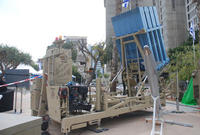-
Alabama proposes law enforcement technology fund
The Alabama State Legislature is currently considering a bill that proposes adding a $10 technology fee to court costs in Chilton County; the fee is aimed at offset the rising technology costs of local law enforcement agencies; local police departments are struggling to comply with state mandates that require local agencies to electronically file tickets and other reports; the state has not provided funding to help departments pay for the operation and maintenance of computer systems; if the fee had been in place last year, it would have generated approximately $90,000
-
-
Spray-on explosives detector
A chemist at Oklahoma State University has developed a spray-on material that detects explosives made from peroxides and renders them harmless; the material is a type of ink that contains nanoparticles of a compound of molybdenum. The ink changes color, from dark blue to pale yellow or clear, in the presence of explosives
-
-
DHS grant saves St. Louis firefighters' jobs

Thirty St. Louis, Missouri firefighters caught a break last week after the city received a $3.2 million grant from DHS; the city had planned on cutting their jobs, but the DHS grant will allow the firefighters to stay employed;the money comes as part of the Staffing for Adequate Fire and Emergency Response (SAFER) program which is aimed at helping local fire departments maintain adequate staffing levels; Federal Emergency Management Agency (FEMA) administers the grant and plans to allocate $420 million this year to fire departments across the country that have been hit by budget cuts
-
-
Security cameras to be installed at all DC metro stops

In response to a rash of crimes near Washington, D.C.’s metro stations, local authorities recently announced plans to install security cameras outside all eight-six train stations; the Metro Board’s Safety and Security Committee released a report several weeks ago that found that last year the number of thefts and robberies had hit five-year highs; the Board has purchased 153 color cameras thanks to a $2.8 million DHS grant; with violent crimes around the Metro on the rise, more residents have begun to push for the installation of security cameras
-
-
Short-range missile tracking satellite demonstrated
There are two weapons the weak can employ against the strong: the first is terror; the second are rockets and short range missiles; to operate rockets and short range missiles, though, the weaker side must be in control of some territory and must have a state ready to supply it with these more advanced weapon systems; Hezbollah (in May 2000) and Hamas (in June 2007) came into control of territory, and are being supplied by Iran and Syria with missiles and rockets; Israel last Sunday deployed the first batteries of its Iron Dome short-range missile defense; the United States is not lagging far behind
-
-
Special rural training for NM park rangers
New Mexico State Park Rangers are currently receiving specialized training from the state’s Department of Homeland Security and Emergency Management; the training is designed to prepare first responders to conduct operations in rural terrain. In particular the program will address the needs of officers working along the state’s southern border with Mexico and in rural areas
-
-
$200,000 grant for upstate N.Y. fire department

Last week the city of Tonawanda in western New York received nearly $200,000 from DHS to purchase new firefighting equipment; the money will be used to purchase harnesses, ropes, victim removal devices, enhanced air supply equipment, and a new communications system; funding comes from the DHS Assistance to Firefighters Grant Program; the grant comes at a critical time as the city is struggling with its budget; several local fire departments nearby also received grants last month including those in Rochester, Youngstown, and Ridge-Culver
-
-
Curry spice could be used to detect explosives
The main chemical in the curry spice turmeric could be the basis for cheap explosives detectors, say researchers; the curcumin molecule is already well-known in medicine for its anti-cancer and anti-oxidant properties. Now, research presented at the American Physical Society meeting suggests it could replace more complex solutions to spot explosives like TNT
-
-
Robot swarm to aid rescue teams
A new system of autonomous flying robots being developed at the Federal Institute of Technology in Lausanne (EPFL) could establish wireless communication networks to aid rescue teams in the event of a disaster
-
-
Senators target apps that help drunk drivers avoid police

Four U.S. senators recently urged Apple, Google, and RIM to remove all apps from their online application stores that could assist drunk drivers or other criminals evade law enforcement officials; in response to the senator’s letter, RIM, announced that it would stop selling apps that help drunk drivers or criminals avoid police detection; the PhantomALERT app taps into a phone’s GPS device and alerts the driver of any active law enforcement zone including checkpoints, speed cameras, and speed traps; since the senator’s letter sales have increased nearly 3,000 percent and downloads were up by 5,000 percent; another similar app has eleven million users
-
-
Three dolphins found dead after U.S. Navy training exercise
Three dolphins died this month during a U.S. Navy training exercise using underwater explosives near the San Diego County coast; environmentalists have argued that the Navy’s sonar exercises can deafen and even kill whales and other marine life; the Supreme Court ruled in favor of the military in 2008
-
-
Israel unveils Iron Dome anti-rocket defense system

Israel on Sunday stationed the first batteries of its Iron Dome short-range missile defense system in the south of the country; the military stressed the initial deployment was experimental; after being deployed in the south, the system will then be deployed along the Lebanese border, from where Hezbollah militants fired some 4,000 rockets into northern Israel during a 2006 war; the most obvious and immediate benefit of the defensive system would be the de-fanging of the two more radical groups in the region, Hezbollah and Hamas; the system, though, is more significant in what it will allow Israel to do vis-à-vis the Palestinians: if the same rockets Hamas is firing at Israel from the Gaza Strip were to be fired from the West Bank, all of Israel’s population and economic centers will be under threat; if Iron Dome proved effective, it would make it easier for Israel to consider deep withdrawals from the West Bank, thus allowing the establishment of a viable Palestinian state without compromising Israeli security
-
-
Indian Point 50-mile evacuation plan unrealistic
Located only thirty-five miles north of New York City, the most populous area in the United States, is the Indian Point nuclear reactor; safety officials are questioning the wisdom of operating a plant so close to New York City; a fifty mile evacuation radius around the plant would affect nearly twenty million people and some say evacuating that many people on short notice is a “fantasy”; NRC is currently conducting a thorough safety review of U.S. nuclear plants and the Indian Point reactor is one of seventeen under scrutiny; New York Governor Andrew Cuomo recently called for the plant to be shut down
-
-
DigiSensory cameras predict crime before it happens
With DigiSensory Technologies’ sophisticated cameras and sensor systems, law enforcement agencies and transportation departments across the United States are now able to proactively monitor and respond to crimes or accidents as they unfold; the company’s Avista sensors process the images that its 3.2 megapixel high-resolution camera records in real time and can automatically detect when a crime is occurring; when it senses something it will alert law enforcement officials instantly; the sensors can also assist transportation departments in analyzing traffic patterns in real time; the system could allow officials to change one way streets, design real time traffic signals, and multiple speed limits to make traffic flow more smoothly
-
-
Lockheed developing autonomous and covert rover
A surveillance robot aims to operate around humans without being detected by them; the machine uses a laser scanner to builds a 3D computer model of its surroundings and uses a set of acoustic sensors to distinguish the proximity and direction of footsteps
-
More headlines
The long view
Why Ukraine’s AI Drones Aren’t a Breakthrough Yet
Machine vision, a form of AI, allows drones to identify and strike targets autonomously. The drones can’t be jammed, and they don’t need continuous monitoring by operators. Despite early hopes, the technology has not yet become a game-changing feature of Ukraine’s battlefield drones. But its time will come.
